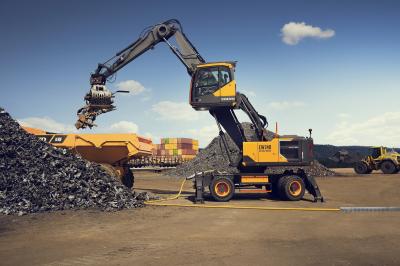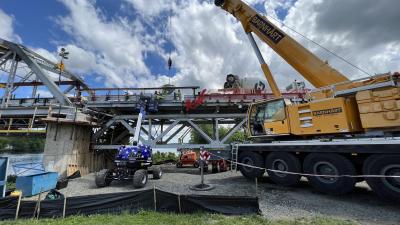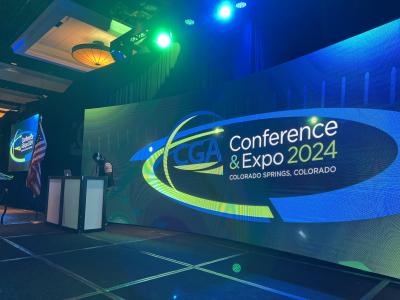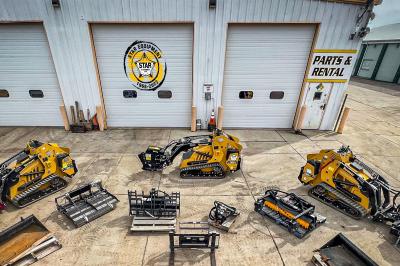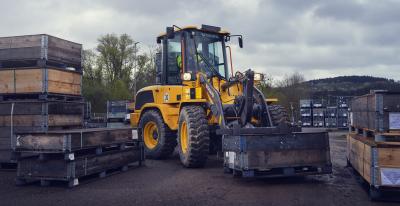The growing suburb of Overland Park, Kan., located in the Kansas City metropolitan area, has historically been known as a top city in which to live. It has been recognized more than 10 times in the past 15 years for being an intelligent, safe and family-oriented city — including recently as one of National Geographic Adventure magazine’s “50 Best Places to Live and Play.” Part of achieving the city’s good reputation, and keeping its nearly 168,000 residents pleased, is Overland Park’s commitment to keeping its streets in good condition.
For years, Overland Park maintained its streets using chip seal because it is inexpensive and provides a durable surface. In the Overland Park area, chip seal costs approximately $1.00 per square yard, whereas micro surfacing costs approximately $2.00 per square yard — depending on which aggregate type is used. In comparison, a 2-in. (5 cm) mill and overlay together costs approximately $12.00 per square yard for residential streets.
Starting in 2006, the city switched from chip seal to micro surfacing. Although chip seal is a less expensive option, the city’s residents felt the surface was too rough and the potential for free flying rock could be harmful. The city already used micro surfacing on its thoroughfare roads and was familiar with the smooth, asphalt-like surface it provides for residents.
The type of micro surfacing used (Type I, II or III) is based on the street classification. The following street descriptions outline street classifications used within Overland Park. All traffic volumes are estimated over a 24-hour period, counting traffic in both directions.
• Residential streets are cul-de-sac type streets that provide access to abutting property and provide limited street parking; often carry up to 2,000 to 3,000 vehicles per day.
• Collector streets are generally spaced 1 mile apart to collect and move traffic generated by a neighborhood to a thoroughfare street; they carry up to 10,000 vehicles per day.
• Thoroughfare streets move large amounts of traffic through areas of the city, and carry up to 50,000 vehicles per day.
Overland Park specified a “continuous run paver or approved equal” and a “hydraulically adjustable spreader box” in the project specifications for its 2007 micro surfacing programs. With streets that vary from 24 to 36 ft. (7.3 to 11 m) in width, it is important to have equipment that is maneuverable. Without this equipment, contractors are forced to make several passes in some areas, creating overlaps of the material and an uneven surface.
“Many contractors are hesitant to use a continuous run machine on residential streets because of its weight and the belief that it has less maneuverability than truck-mounted units,” said Matt Laipple, EIT civil engineer, and project manager for Overland Park’s pavement maintenance programs. “Most of our residential streets are at least 6 inches thick, so we have not had any trouble with the weight of a continuous run machine, provided the street has a stable base. We also find that, with a good crew, the machine is very maneuverable and works around the city’s obstacles without any problems.”
Ballou Construction Company — based in Salina, Kan. — won the 2007 bid to micro surface streets in the north half of Overland Park. The company used a full-size Bergkamp M1 continuous paver and a variable-width spreader box to successfully micro surface nearly 1.2 million sq. yd. (1 million sq m) of the city’s residential, collector and thoroughfare streets north of I-435. The job included approximately 240 residential and collector streets and seven thoroughfare roads — including two of the city’s busiest thoroughfares: Quivira Road and 75th Street.
“Micro surfacing provides a quick in-and-out-job that sets very fast,” said Rex Eberly, Ballou’s vice president, and project manager of the Overland Park resurfacing job. “There is no loose aggregate, less dust, and the surface is nice and smooth. The latex modification of the emulsion is durable, lasting at least six to eight years. Overall, it is one of the best surfaces for the money.”
Communication Is Key to Success
The use of a continuous paver and a unique public relations program were key factors that allowed the job to go smoothly. Because of the job’s complexity and potential impact to the citizens’ daily travels, Overland Park required that the contractor implement an intensive public relations program.
The city specified that the contractor maintain a clear line of communication with residents and that residents be alerted 48 hours prior to work being started. Additionally, residents were provided with a map of their neighborhood, showing locations where the streets would be closed and where it was safe to park. Public relations requirements were provided within the project specifications and the work was compensated by the inclusion of a bid item for the same.
The city sent out letters in April — approximately one month before the project began — to all residents that would be affected by the micro surfacing, letting them know that maintenance was scheduled for their streets sometime during the summer. Then a postcard was sent to each resident two weeks before the micro surfacing commenced, as an alert that work would begin soon. Finally, Ballou put a door hanger on each resident’s door 48 hours prior to performing preventive maintenance on a street. The door hanger included:
• Date the street and/or driveway would be closed
• Where the resident should park during construction
• Possible causes for delay
• Contact information for any questions
• Instructions that residents should follow before driving on the newly micro surfaced street
Ballou also was required to have a separate phone number and an available receptionist to answer questions from 7 a.m. to 6 p.m. every day. The receptionist was required to keep a log for each caller, including:
• Date and time of the call
• Name and address of the citizen
• Synopsis of the concern and the operator’s response
• Description of the action required by the contractor or city
• Date the action was completed
“The end result was very successful,” said Laipple. “Ballou attached a map showing which streets were safe to park on in the neighborhood, an addition that was highly appreciated by the residents. Next year, our public relations program will be very similar. Overall, the public relations program reduced our calls by 50 percent compared to previous years, and kept the public well-informed.”
Half A City In Four Months
Ballou Construction Company has been in the micro surfacing business since 1980. It has approximately 90 to 100 pavement surfacing employees that have performed work in Kansas, Minnesota, Nebraska, New Mexico, Oklahoma and Texas and has built a good reputation with many cities in those states.
When completing the Overland Park job, Ballou focused only on micro surfacing and subcontracted the chip seal work. It laid approximately 431,000 sq. yd. (360,371 sq m) of Type III micro surface on thoroughfare roads and 752,000 sq. yd. (628,768 sq m) of Type II micro surface on residential and collector streets. This equates to what Overland Park considers to be 65 center lane miles — one center lane mi. equals a street approximately 24 ft. (7.3 m) wide and 1 mi. (1.6 km) long.
A mixture of approximately 86 percent aggregate, 12 percent emulsion and 2 percent cement was used — with water being added as needed, depending on the temperature outside. On hot days more water is required, but on cooler days it takes very little water to create a good mixture. In total Ballou used:
• 10,800 tons (9,797 t) of aggregate
• 318,000 gal. (1,203,761 L) of emulsion
• 211 tons (191 t) of cement
The continuous paver teamed with mobile support units to constantly lay the micro surface without stopping, thus eliminating starts and stops that create bumps for residents. The mobile support units carry aggregate, emulsion and water that are continuously transferred to Bergkamp’s M1 continuous paver. The use of a variable-width spreader box allowed the crew to quickly adjust the width of the box to fit the varying shapes of the roads.
“The variable-width spreader box adjusts widths on the fly, which makes it easy to do tight jobs,” said Eberly. “The combination of the box and the M1 continuous paver, which is very maneuverable, make for a great team when resurfacing residential, collector or thoroughfare streets. Allan Jensen, the project superintendent, and his crew are very familiar with this equipment and the process and were a major key to this job’s success.”
The contractor faced one main obstacle — the weather. Every day it rained, the crew was forced to stop working. In some stretches the job was stopped for multiple days in a row, requiring Ballou to rework its schedule and communicate the delay with the local residents. And, as with every job, the crew had to be extremely aware of its surroundings to avoid injury and damage.
“Micro surfacing is a safe and green process that doesn’t create many environmental issues,” said Eberly. “However, we are still very careful and take additional precautions when resurfacing near lakes, streams and other bodies of water.”
When Does A Street Need Maintenance?
Overland Park follows a specific procedure to determine which streets need maintenance. Each year, the city examines about half of its streets, so that every street in Overland Park is examined at minimum every two years. The city looks at the same spots in each pavement section, and tallies how many cracks, raveling spots, potholes and other pavement defects exist. Based on the findings, city engineers calculate a Pavement Condition Index (PCI) to determine a deterioration curve and help decide when the pavement needs maintenance.
Many different things can affect each street’s PCI, including the subsurface conditions, traffic volume, maintenance history and sun exposure. In some cases, the city’s residents don’t see the need for preventative street maintenance because they can’t physically see major damage on the street.
“Preventive maintenance should be handled before the street begins to develop significant problems,” said Laipple. “Once deterioration starts, it goes so fast that many times it is too late for maintenance when you notice the need. I like to compare it to your house’s siding.
When the siding on your house shows a little peeling paint, you don’t tear it all off just because it needs painted. You protect the house from the elements by painting it before it deteriorates to the point that it is no longer serviceable. Streets are the same way. They don’t need a new, expensive asphalt overlay if you preserve them before they get bad, which saves the city money and enables us to better keep all of our streets in very good condition.”
On average, Overland Park performs maintenance on each street every seven years — at 7, 14 and 21 years old. Generally at about 28 years, streets are milled and overlaid with asphalt. The city plans its maintenance programs up to two years prior to the actual work being performed. It issues a notice to bidders in December, and then awards the job to the lowest bidder sometime in January of the maintenance year. The micro surfacing program is split into two halves — allowing more than one contractor to perform the work. This enables Overland Park to meet its October deadline for completion and make necessary adjustments to the program — like resurfacing additional streets — as the need arises.
The Results Are In
Upon completion of the project, Overland Park sent out a survey to each resident that was affected by the micro surfacing program. Both Ballou and Overland Park received very high marks from the residents. Overall, they were extremely happy with the construction workers’ and city staff’s attitudes and responsiveness, as well as the quality of the job. It seems certain that both the public relations program and the equipment used on the job were major contributors to this success.
“When done correctly, micro surfacing is very popular with our residents,” said Laipple. “We plan to use the same public relations program in the future, and I can’t complain about the final product. A Bergkamp representative stopped frequently just to make sure everything was running smoothly. The Bergkamp micro surfacing equipment was very maneuverable, and the final appearance looks much like an asphalt overlay.”
Bergkamp manufactures all of the continuous paving units, mobile support units and spreader boxes that Ballou uses. Currently, it uses five M1 continuous pavers, 20 mobile support units and five variable-width spreader boxes on its resurfacing jobs.
“Ballou has worked with Bergkamp since 1980, when we worked with them on the design of the early M1,” said Eberly. “The M1 is a very well-built and easy-to-maintain machine that is extremely user-friendly. Many contractors feel that a continuous paver is too large, and not economically feasible in confined areas. But with a good crew and the use of a variable width spreader box, you can easily do these jobs without a problem, and then use the unit on your large jobs as well. We believe that the M1 is the most efficient type of paver because we can complete highway work and city work with the same equipment. One machine can do everything.”
For more information, visit www.opkansas.org or www.bergkampinc.com.
Today's top stories





